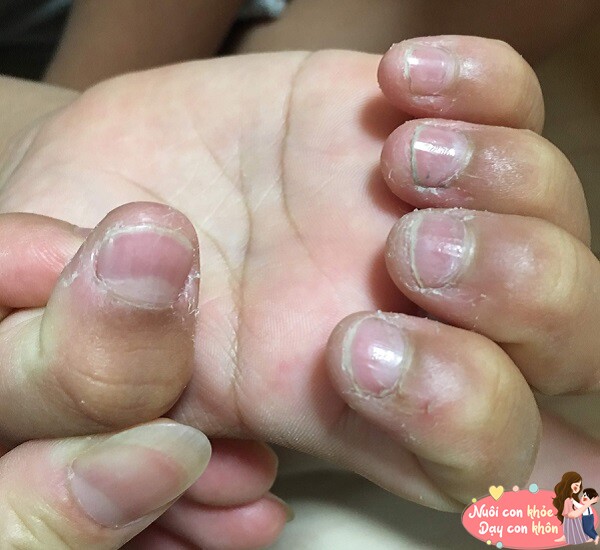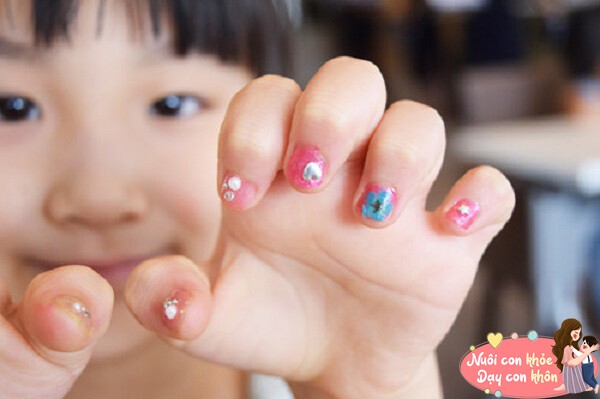Shyly, the girl replied, “I… can’t hold it anymore!” As she spoke, she bit her nails, even drawing blood. Guilt and shame were evident on her young face.
Her mother slapped her hand repeatedly to no avail. “Look at you, you’ll amount to nothing. You might as well drop out of school!”
This phenomenon of children biting their nails from a young age is not an isolated case. Many other children exhibit similar habits.


Why do some children bite their nails?
Children lacking trace elements
Children deficient in trace elements may face various health issues. For instance, zinc deficiency can lead to pica, causing children to bite their nails and even eat unusual things like dirt and hair. However, this reason accounts for only a small proportion of the causes of this behavior.
Zinc, iron, calcium, and magnesium are essential for growth and development. When children do not get enough of these nutrients, their immune system, concentration, and brain development may be affected.

The phenomenon of children biting their nails from a young age is not uncommon.
Incomplete oral phase (0-2 years old)
Infants explore the world by sucking on their fingers and biting objects. Meanwhile, adults often unconsciously hinder this behavior, so the child’s needs are not met, and they continue to bite their nails unconsciously.
Psychological reasons: Anxiety and stress
This is the most common and fundamental reason for children’s nail-biting, and it is also the easiest for parents to overlook.
Some children feel anxious when facing unfamiliar environments, academic pressure, parental conflicts, or the absence of a caregiver. This behavior can temporarily relieve their stress and become a means of soothing their emotions.
Simply put, it is a way of releasing emotions. When children bite their nails, it is sometimes not just a habit but also a psychological conditioned reflex.

Most children’s nails become deformed, turning red, swollen, and even developing pus.
When a child bites their nails for the first time and realizes it helps them relax, they will repeat this action the next time they feel anxious. If they are scolded by their parents or mocked by their peers, they will become even more anxious and have no other way to relieve their stress except by biting their nails.
Over time, this creates a vicious cycle: Anxiety → Nail Biting → Blame → Increased Anxiety → Increased Dependence on Nail Biting.

Two likely outcomes if children continue nail-biting for an extended period:
Deformed nails and health issues
Some children continue to bite their nails even as they grow older. In reality, most children’s nails become deformed, turning red, swollen, and even developing pus.
When children bite their nails, they risk ingesting germs and dirt from their hands, increasing their chances of getting sick and affecting their overall health. Additionally, prolonged damage to the nails and surrounding skin can lead to chronic infections, causing discomfort and pain, further increasing anxiety and stress.

Nail-biting can be reduced by painting nails, but choose child-safe products.
Low self-esteem and avoidance behavior
Some children bite their nails due to anxiety and nervousness. This is an avoidance behavior and a sign of low self-esteem.
Children often use this method to divert attention from the issue instead of facing it directly: biting their nails during a test, after an argument with a classmate, or when scolded by their parents…
Over time, children lose the opportunity to learn positive ways to cope with their emotions.
Of course, apart from these two outcomes, many children naturally outgrow the habit, and the physical and psychological issues diminish.
In addition to children self-correcting their bad habits, parents also need to actively and scientifically intervene.

The key to stopping nail-biting is not prevention but finding alternative solutions.
Find healthier ways for children to release their emotions.
Address the specific reasons
Observe and identify the reasons why your child bites their nails.
For example, in what situations is your child more likely to bite their nails? When they are alone, anxious, or bored?
If they bite their nails while playing, it may be a familiar habit. Parents can remind their children to stop biting their nails by using gloves, nail polish, and other physical barriers.
If it happens before an exam or after being criticized, it may be related to their emotions. Parents need to teach children healthy ways to relieve stress, such as hugging a parent, playing with toys, exercising, or deep breathing.
Parents can also make a secret agreement with their child: When the child bites their nails, gently tap their shoulder as a reminder to change their behavior.

Observe and identify the reasons why your child bites their nails.
Minimize scolding and provide more encouragement
Statements like “Don’t bite your nails!” “I’ll punish you if you don’t stop!” or “Biting your nails is a waste of time” will only increase your child’s anxiety.
The right approach is to encourage them. For example, “This time, you bit your nails less, which shows progress. I believe you can gradually overcome this habit.” This way, your child knows they can overcome stress positively.
In addition to verbal encouragement and building self-confidence, parents should also reward their children with gifts. For instance, keep a record of how many times your child bites their nails each day and give them a reward if they reduce this habit. Once the underlying cause is addressed, the behavior will naturally change.
































